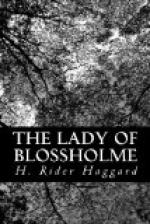“Aye, master,” answered the serving-man. “I chanced to be in the little chamber beyond the wainscot with others waiting to escort the Abbot home, and heard them all, and afterward I and they put our marks upon the writing. As I am a Christian man that is so, though, master, this is not the place that I should have chosen to speak of it, however much I might be wronged.”
“It will serve my turn,” said the enraged knight, “though it is true that I will speak of it louder elsewhere, namely, before the King’s Council. To-morrow, my Lord Abbot, this paper and I go to London, and then you shall learn how well it pays you to try to pluck a Foterell of his own.”
Now it was the Abbot’s turn to be frightened. His smooth, olive-coloured cheeks sank in and went white, as though already he felt the cord about his throat. His jewelled hand shook, and he caught the arm of one of his chaplains and hung to it.
“Man,” he hissed, “do you think that you can utter such false threats and go hence to ruin me, a consecrated abbot? I have dungeons here; I have power. It will be said that you attacked me, and that I did but strive to defend myself. Others can bring witness besides you, Sir John,” and he whispered some words in Latin or Spanish into the ear of one of his chaplains, whereon that priest turned to leave the room.
“Now it seems that we are getting to business,” said Jeffrey Stokes, as, lying his hand upon the knife at his girdle, he slipped between the monk and the door.
“That’s it, Jeffrey,” cried Sir John. “Stop the rat’s hole. Look you, Spaniard, I have a sword. Show me to your gate, or, by virtue of the King’s commission that I hold, I do instant justice on you as a traitor, and afterward answer for it if I win out.”
The Abbot considered a moment, taking the measure of the fierce old knight before him. Then he said slowly—
“Go as you came, in peace, O man of wrath and evil, but know that the curse of the Church shall follow you. I say that you stand near to ill.”
Sir John looked at him. The anger went out of his face, and, instead, upon it appeared something strange—a breath of foresight, an inspiration, call it what you will.
“By heaven and all its saints! I think you are right, Clement Maldon,” he muttered. “Beneath that black dress of yours you are a man like the rest of us, are you not? You have a heart, you have members, you have a brain to think with; you are a fiddle for God to play on, and however much your superstitions mask and alter it, out of those strings now and again will come some squeak of truth. Well, I am another fiddle, of a more honest sort, mayhap, though I do not lift two fingers of my right hand and say, ‘Benedicite, my son,’ and ‘Your sins are forgiven you’; and just now the God of both of us plays His tune in me, and I will tell you what it is. I stand near to death, but you stand not far from the gallows. I’ll die an honest man; you will die like a dog, false to everything, and afterwards let your beads and your masses and your saints help you if they can. We’ll talk it over when we meet again elsewhere. And now, my Lord Abbot, lead me to your gate, remembering that I follow with my sword. Jeffrey, set those carrion crow in front of you, and watch them well. My Lord Abbot, I am your servant; march!”




